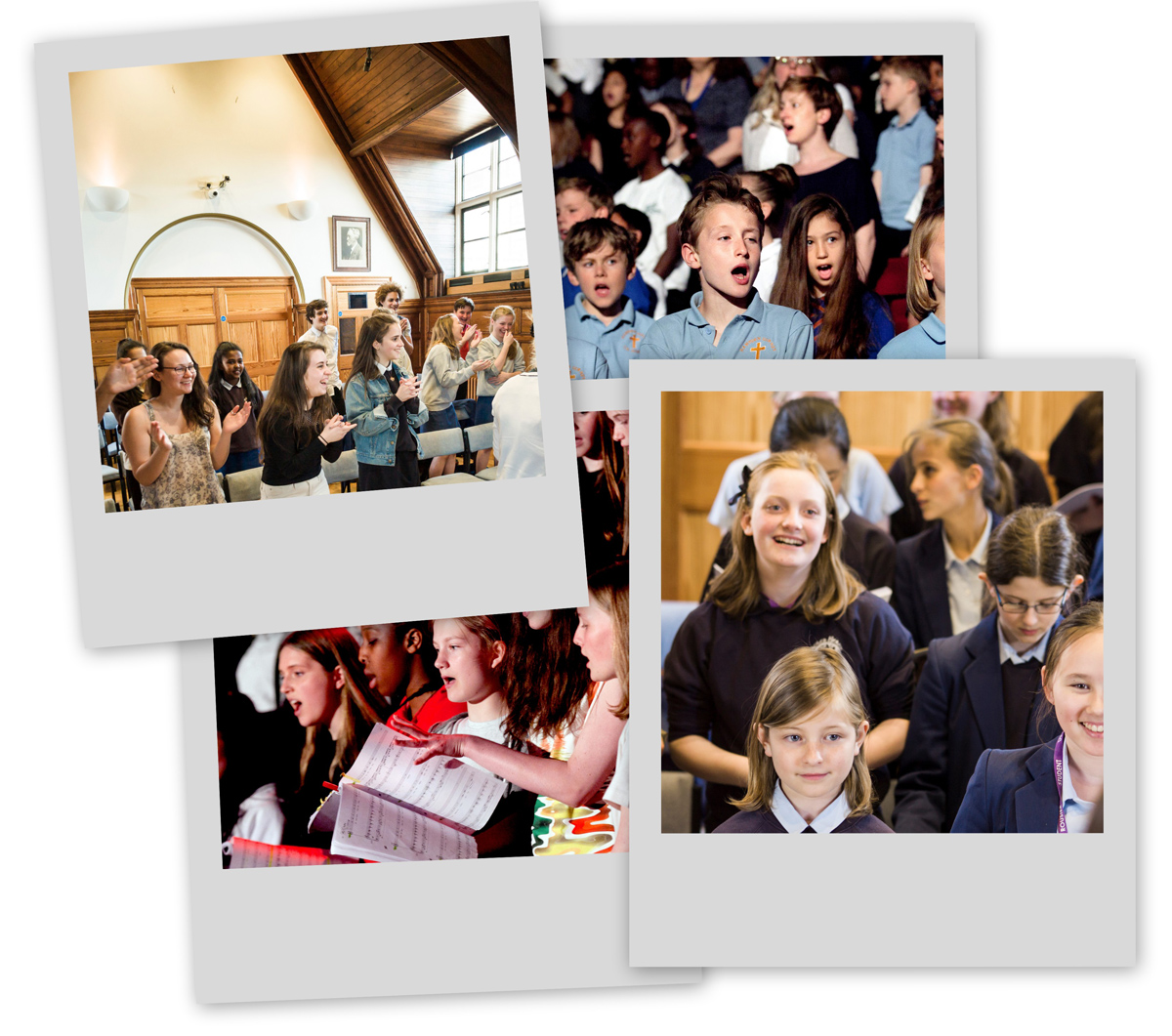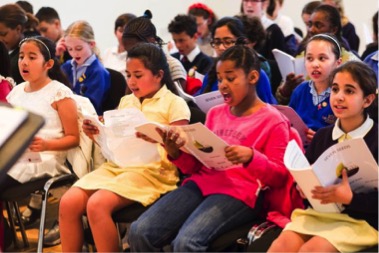Seven Seeds was a large-scale musical project run by the Tri-borough Music Hub along with strategic partners the Aurora Orchestra, the Royal College of Music and the Royal Albert Hall.
Seven Seeds was a large-scale musical project run by the Tri-borough Music Hub (TBMH http://www.triboroughmusichub.org ), along with strategic partners the Aurora Orchestra, the Royal College of Music and the Royal Albert Hall. It is the title of a major new work by composer John Barber that brought together over 1,200 young people for a performance at the Royal Albert Hall and also united the community in a celebration of musical achievement that was a culmination of three years’ work.

The aims, as set out in the original proposal, were to:
- Develop an exceptionally high standard of performance by children and young people by working alongside professional singers and players;
- Provide new opportunities for pupils to work with professionals, from a number of art forms, with a common goal;
- Build capacity through education and training provided to school staff and conservatoire students, creating a legacy of highly-skilled individuals who could increase the quality of music engagement opportunities in the Tri-borough;
- Raise the standard of group singing in schools; and
- Inspire and support schools in developing cross-curricular projects linked to common theme(s) within a new work.
How does it fit into the ethos of the school/setting?
The project formed part of the Singing Strategy for the Tri-Borough. Following a twilight teachers’ CPD session, intensive rehearsals ran in schools to teach the Seven Seeds music. Supported by TBMH vocal lead tutors and students from the Royal College of Music and Royal Academy of Music, children were required to commit to memory the challenging repertoire.
How does it fit into the learning strategy of the school/setting?
The first two years of activity on Seven Seeds comprised extensive planning and development, devising activities with over 330 young people in order to inform them about the creation of the work, provide consultancy and training with teachers, create resource packs and rehearsal CDs and initiate early stage rehearsals for participants.
Each school received at least two sessions from TBMH specialist vocal leaders, with more intensive bespoke programmes made available to those non-specialist music teachers who requested additional support. SEND schools also received a greater number of sessions from TBMH and Chicken Shed Theatre and had an opportunity to work with composer John Barber and writer Hazel Gould, theatrically exploring the narrative, characters and themes within the story.
Part of the project involved a mentoring programme where, over a period of three months, members of Albert’s Band ( http://www.royalalberthall.com/tickets/series/alberts-band/ ) and students from the Royal College of Music, began work with five pre-selected TBMH instrumentalists (violin, cello, flute, trombone and trumpet) to prepare and study the orchestral music.
How does it fit into the curriculum of the school/setting?
As part of the National Curriculum for Music in the Primary age phase (KS1 and KS2), children are required to ‘learn to sing and to use their voices, to create and compose music on their own and with others’.
In preparing the children for singing in a massed choir, three local borough rehearsals were scheduled for 450 children from 20 schools at any one time. Each rehearsal was led by Choral Master, Ralph Allwood, and the young people had the opportunity to sing their parts in context with up to four additional vocal lines and also to meet the professional soloists – Yvonne Howard, Marcus Farnsworth and student Sinead O’Kelly.
Through the creation of a cross-curricular resource pack, schools were encouraged to engage in Seven Seeds in its widest context – exploring the themes through performing, arts, literacy, history and science.
What outcomes are being explicitly targeted?
The aims were:- To develop an exceptionally high standard of performance by children and young people by working alongside professional singers and players; and
- To provide new opportunities for pupils to work with professionals, from a number of art forms, with a common goal.
What is the context of the work?
Setting
Over the course of five months, 115 hours of TBMH-led vocal activity took place across the Tri-Borough’s 49 primary schools, including during school time and out-of-school hours, with an additional estimated 675 hours of teacher-led rehearsals. Rehearsals were held at the Royal College of Music, Lyric Theatre and Royal Albert Hall leading up to the event, with education and training for staff being held at schools and in local training centres.
To prepare the children for singing in a massed choir, three local borough rehearsals were scheduled for 450 children from 20 schools at any one time at the Lyric Hammersmith. Meanwhile, orchestral rehearsals took place with musicians from the Aurora Orchestra, Albert’s Band, Southbank Sinfonia, Royal College of Music (RCM), Royal Academy of Music (RAM) and five young instrumentalists from the Tri-Borough Music Hub, together with conductor Nicholas Collon for a full day of rehearsals at the RCM.
Age and number of students
Vocalists were Primary and Secondary school pupils aged between 7 – 18 years and with the five young instrumentalists aged 12 – 18 years. A total of 1,200 performers took the stage at the Royal Albert Hall. Over the course of the project, hundreds of young people from across Primary, Secondary and SEND schools had the opportunity to engage directly with professionals involved in the project and seeking to inspire a new generation of musicians.

Does the example fit into longer term plan or is it ‘stand-alone’
Seven Seeds was conceived as a ‘stand-alone’ project.
Who is leading the work?
The work was led by TBMH in partnership with strategic partners, the Aurora Orchestra, the Royal College of Music and the Royal Albert Hall.
What is the content of the work?
The content of the work embraced the following strands of development:
- Performing new repertoire – intonation, dynamics, phrasing, expression, fluency;
- Listening – aural accuracy; and
- Musical knowledge – notation, musical style and genre.
- Expressiveness, aesthetic sensitivity and discrimination; and
- Character and moral/spiritual development.
- Individual and group (solo, duo, small-group, ensemble) activities;
- Communication with an audience; and
- Interpersonal skills and relationships with others
What are the key features of the teaching and learning approach?
The teaching and learning approach had the following key features:
- Leader-centred – vocal leaders lead from the front with pupils and also through team teaching and modelling with teachers who were then supported and empowered to lead their own rehearsals;
- Pupils learned vocal repertoire by rote, with a focus on oral/aural development; and
- The pedagogic language used was formal, seeking to ensure a parity of approach by all the leaders concerned.
How is the work being reviewed?
All participating schools were required to complete an online Survey Monkey questionnaire that investigated the impact of Seven Seeds on those young people that took part. Of the 45 schools that participated, 30 responses were received (see appendix 1). The evaluation sought to ascertain the level of respondents’ agreement with a range of statements. The questionnaire data indicated a high level of agreement concerning positive outcomes. In particular that:
Seven Seeds:
- supported the children's musical development – 97%;
- gave the children a sense of achievement – 100%;
- developed the children's ability to concentrate – 94%;
- increased the children's confidence – 90%;
- was inspiring and motivational – 93%;
- supported personal, social and emotional development – 84%; and
- developed the children's ability to work with others – 87%
What are the positive outcomes for children/young people – are they some or all of musical, social, personal, educational - how and when can they be identified?
It was noted that the standard of group singing within and across participating schools was raised considerably as a direct result of Seven Seeds, with the quality and confidence in the children and teachers being particularly noticeable during the vocal team’s school visits, as well as in the final rehearsals and performance.
There was a notable surge also in overall school engagement in the music hub’s activities, with a greater number of schools signing up to sing in the Summer and Christmas Singing Festivals. Whilst Seven Seeds schools were amongst the first schools to sign up to other initiatives, the hub also noted the inclusion of schools which had not participated in any other projects before – demonstrating a legacy of positive engagement in musical opportunities in the Tri-borough.
Through the Seven Seeds project, the Royal Albert Hall and Royal College of Music were able to offer student musicians and singers the opportunity to mentor the young people from across the Tri-borough, which was a valuable opportunity for their own professional development. The Hall also engaged a number of new Albert’s Band players with whom they had not worked previously, all of whom are now regularly engaged for educational activity led by the Hall.
What are the key features of teacher/leader behaviour that are enabling those positive outcomes?
The pedagogic approach had the following fey features:
- Materials and resources were designed to match stage/age of learners;
- The approach and content was designed to be inclusive of the needs of individuals and groups, including pupils with SEND;
- The team were well prepared to meet the requirements and aspirations of learners;
- There was a rich and relevant musical challenge to create, recreate, listen and respond;
- The expectations about outcomes from series of sessions or lessons were made clear; and
- Informal feedback to participants was regular and through musical and/or verbal interactions.
What are the key features of context, content and activities that are enabling those positive outcomes?
The key features of context, content and activities supported successful engagement because:
- Expectations of music leader were clear to all participants;
- There were no barriers to participation; and
- Sessions generated enthusiasm, concentration and energy from participants.
What other factors in this case are contributing to those positive outcomes?
By working in partnership with exceptional professional arts organisations, the performance of Seven Seeds was of a very high quality, resulting in positive outcomes for pupils involved. The involvement of professional musicians pushed artistic boundaries, with musical standards being equal to customary concert repertoire for adult performers and audiences. Preconceptions around the kind of music suitable for young performers and audiences have led to a deep-seated conservatism in concert programming for children. However, Seven Seeds provided a clear example of how young people’s performances can be artistically rich, without the need for musical compromise, or ‘dumbing down’.
How replicable or adaptable is it?
The project is seen as easily replicable and adaptable with appropriate vision, partners and venues.
Resources
